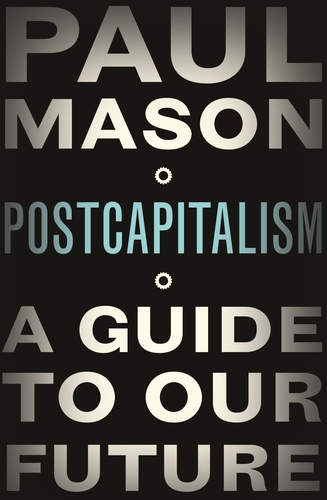PostCapitalism


Paul Mason is the award-winning economics editor of Channel 4 News. His books include Why It’s Kicking Off Everywhere: the New Global Revolutions; Live Working Die Fighting ; and Meltdown: The End of the Age of Greed. We are publishing a series of review features on his work which we believe to be hugely significant. This will culminate in a live online discussion with Paul and the other reviewers at the end of the week. Use the hashtag #postcapitalist.
We think its significant that this work comes not from a theorist but from a journalist reflecting on lived experience. We also welcome Paul’s approach which is to say ‘open this debate’ – ‘I may not have got this right’. Paul writes in apiece that has already been shared hundreds of thousands of times:
“Postcapitalism is possible because of three major changes information technology has brought about in the past 25 years. First, it has reduced the need for work, blurred the edges between work and free time and loosened the relationship between work and wages. The coming wave of automation, currently stalled because our social infrastructure cannot bear the consequences, will hugely diminish the amount of work needed – not just to subsist but to provide a decent life for all.
Second, information is corroding the market’s ability to form prices correctly. That is because markets are based on scarcity while information is abundant. The system’s defence mechanism is to form monopolies – the giant tech companies – on a scale not seen in the past 200 years, yet they cannot last. By building business models and share valuations based on the capture and privatisation of all socially produced information, such firms are constructing a fragile corporate edifice at odds with the most basic need of humanity, which is to use ideas freely. Third, we’re seeing the spontaneous rise of collaborative production: goods, services and organisations are appearing that no longer respond to the dictates of the market and the managerial hierarchy. The biggest information product in the world – Wikipedia – is made by volunteers for free, abolishing the encyclopedia business and depriving the advertising industry of an estimated $3bn a year in revenue.
Almost unnoticed, in the niches and hollows of the market system, whole swaths of economic life are beginning to move to a different rhythm. Parallel currencies, time banks, cooperatives and self-managed spaces have proliferated, barely noticed by the economics profession, and often as a direct result of the shattering of the old structures in the post-2008 crisis.”
Read the whole article here ‘The end of capitalism has begun’.
.

This will simply be a rebalancing IMO. Corporations will still exist in the distant future, they’ll just have to operate in a world where instantly mobilised people power will be a major driver of corporate actions.
I tried reading Mason’s article but couldn’t get through it. It reads like a lot of stuff strung together with no real argument or substance.
The trouble with a many critics of neoliberalism is they don’t understand it or what makes it different from liberalism (e.g. the difference between Smith and Hayek). You can’t attack it effectively if you don’t understand it. All one gets is a lot of woolly thinking and some wildly utopian vision of a future that will never be.
For a hard analysis of Neoliberalism try starting with Mirowski’s The Thirteen Commandments of Neoliberalism and then read some of his Crisis book. Either would make for more interesting discussion.
I couldn’t even begin to offer a critique on Paul Mason’s offering, having neither the will nor the intellect to make a worthwhile contribution. One aspect of his vision of the future however, has already received some attention in the past. ” The wave of automation currently stalled” was visited in some detail back in the 1960’s in a television production called ” Time on our hands”. Although it had not foreseen the effects of micro-processors and was more focussed on the electro-mechanical – hydraulic world of machines, much of it was relevant.
The manufacturing industry would by and large employ only the most skilled technicians to”assist ” with servicing production machinery. Workers would now be paid not to work or demand the right to work. Some would be on a two day week and “those bastards” would be up there in their offices on a three day week. It had an almost Ealing Studios Comedy aspect to it, but it showed a hint of a reality to come, where Joe Public, after an initial love affair with the new order found that he needed to fill his days with something productive and couldn’t think what it might be. He could of course seek work in under-developed countries.
The suggested outcome of this scenario was not just civil unrest, but civil war.